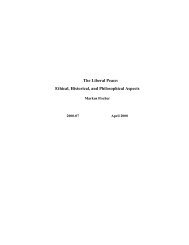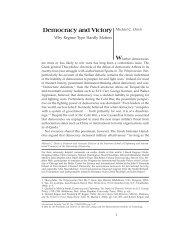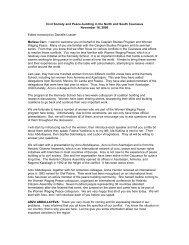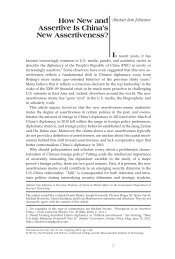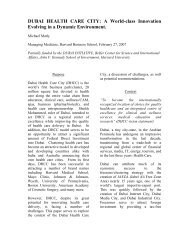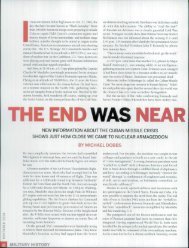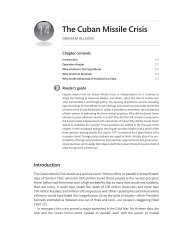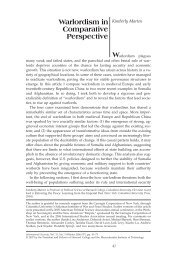The Cuban missile crisis and intelligence performance
The Cuban missile crisis and intelligence performance
The Cuban missile crisis and intelligence performance
Create successful ePaper yourself
Turn your PDF publications into a flip-book with our unique Google optimized e-Paper software.
Downloaded by [Harvard College] at 08:23 18 September 2012<br />
194 INTELLIGENCE AND THE CUBAN MISSILE CRISIS<br />
will help prepare the ground for our discussion of how retrospective<br />
evaluation can be used constructively. Because of the richness of the<br />
available record, the US 'failure' to predict the Soviet deployment will<br />
serve well.<br />
<strong>The</strong> Stennis Report concluded that the 'predisposition of the [US]<br />
<strong>intelligence</strong> community to the philosophical conviction that it would be<br />
incompatible with Soviet policy to introduce strategic <strong>missile</strong>s into Cuba'<br />
was the primary cause of its failure to predict the deployment. 65 This<br />
preconception, according to the report, prevented the <strong>intelligence</strong><br />
community from giving 'proper weight' to 'indications to the contrary'. 66<br />
<strong>The</strong> implication is that US <strong>intelligence</strong> should not have been so firmly<br />
wedded to its preconceptions, <strong>and</strong> if it had not been, it might not have made<br />
this important error.<br />
<strong>The</strong> Stennis Report's conclusions provide an interesting example of<br />
Monday-morning quarterbacking. Did the US <strong>intelligence</strong> community have<br />
'good reasons' for relying less heavily upon the preconception that such a<br />
deployment would be incompatible with Soviet strategic policy? Garthoff<br />
writes: 'In the absence of clear evidence of deployment, the estimate [i.e.,<br />
SNIE 85-3-62] had to rest on an assessment of Soviet intentions, <strong>and</strong> the<br />
past record tended to support the conclusion that the Soviet leaders would<br />
not deploy strategic nuclear <strong>missile</strong>s in Cuba.' 67 Our sense is that most<br />
professional <strong>intelligence</strong> analysts, <strong>and</strong> most scholars of the <strong>Cuban</strong> <strong>missile</strong><br />
<strong>crisis</strong>, would concur with this judgment.<br />
Garthoff's statement has several interesting features. <strong>The</strong> first is the<br />
phrase, 'In the absence of clear evidence of deployment'. What, exactly, is<br />
'clear evidence of deployment'? 'Only direct evidence, such as aerial<br />
photographs, could be convincing', Garthoff writes. 68 As a psychological<br />
matter, this was undoubtedly true in 1962. Neither President Kennedy, nor<br />
senior members of the <strong>intelligence</strong> community - DCI McCone included, we<br />
suspect, since he was so concerned about stepping up photographic<br />
coverage of the isl<strong>and</strong> - would have been willing to conclude that the<br />
Soviets were deploying <strong>missile</strong>s to Cuba without photographs of Soviet<br />
<strong>missile</strong>s in Cuba. But ought American officials to have had such a<br />
dem<strong>and</strong>ing st<strong>and</strong>ard of proof? <strong>The</strong> Stennis Report did not state, but seemed<br />
to imply, that the answer was no, concluding that a contributing cause of the<br />
failure was the CIA's tendency 'to discredit <strong>and</strong> downgrade the reports of<br />
<strong>Cuban</strong> refugees <strong>and</strong> exiles'. 69 As we have already suggested, if the CIA<br />
discounted reports simply on the ground that they came from <strong>Cuban</strong><br />
sources, this would at least have been a logical error, <strong>and</strong> might also have<br />
been a pathological prejudice. 70 But would it have been an avoidable one? It<br />
is easy to say in retrospect that the CIA should not have been so hard on<br />
<strong>Cuban</strong> refugee reports, but it is difficult to imagine how CIA analysts




